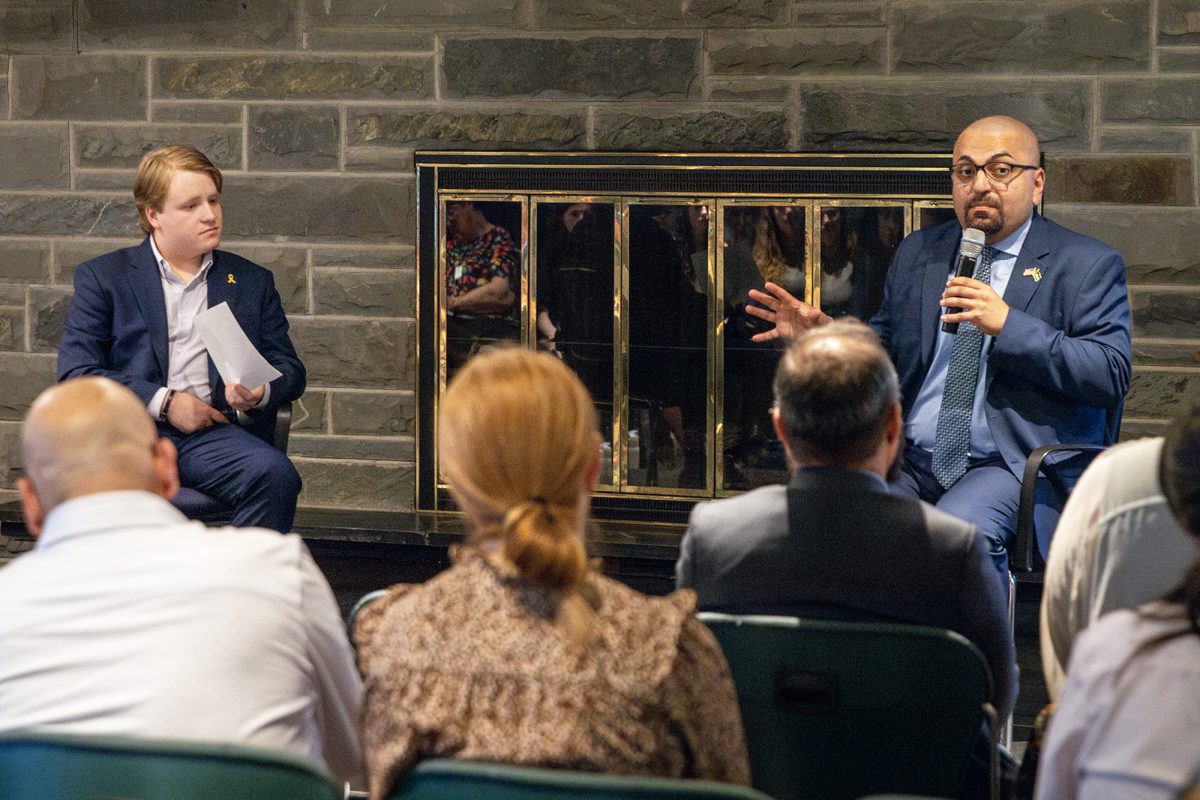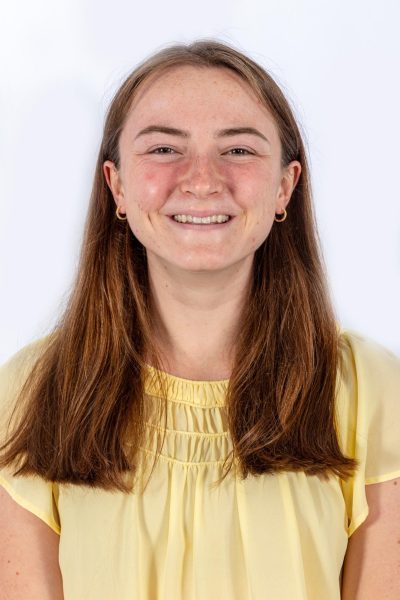Ahmed Fouad Alkhatib, a pro-Palestine activist and resident senior fellow at the Atlantic Council, visited Ithaca College on April 28 for a discussion titled “Breaking Cycles of Dehumanization.”
The event was organized by Ithacans for Israel and Realign for Palestine, a project from the Atlantic Council that strives to promote peaceful activism and radical pragmatism — which focuses on pursuing achievable solutions instead of solutions aligned with ideology. Realign for Palestine advocates for a two-state solution as a path forward for peace between Palestinian and Israeli people.
The discussion was sponsored by the Office of the President, the Department of Politics and Stanley Bazile, the vice president of Student Affairs and Campus Life. The reception was sponsored by the Office of Religious and Spiritual Life.
The event opened with the debut screening of “Waging Peace,” a film that documents Alkhatib’s advocacy for a two-state solution and work to create Realign for Palestine.
Alkhatib grew up in Gaza City and left to live in the U.S. as an exchange student in 2005. Alkhatib said he has lost 33 family members in the latest Israel-Hamas war. He said in the film that he works to use his voice as a Palestinian person to help others understand that multiple truths about the war in Gaza can coexist.
“October 7 [was] a horrendous massacre, and what’s happening in Gaza is an utter disaster,” Alkhatib said. “The Jewish people do have historical roots to the land, even though I know that my family and grandparents have lived there for hundreds of years. The two don’t have to cancel each other out.”
Alkhatib said in the film that there is a common narrative that Hamas is an organic resistance fighting against injustice and oppression of Palestinians, but that Hamas has manipulated Gazan citizens and escalated violence in the conflict.
Alkhatib said some perspectives on the Israel-Hamas war argue for ending oppression of Palestinian people through any means, including violence. Alkhatib said these are maximalist perspectives that do not recognize the layers of the conflict and encourage division instead of discussion about a lasting solution.
Alkhatib said he hopes Realign for Palestine will promote radical pragmatism and encourage people to reject violence and pursue a two-state solution.
“Pro-Palestinian statehood and self-determination are not mutually exclusive to being pro the Jewish people’s right to nationhood and to live in peace in a secure Israel,” Alkhatib said. “There’s an imbalance of power dynamics between Israel and Palestine…. [but] my thesis is that we have plenty of space for agency and accountability and responsibility. I want to rebrand peace and coexistence as courageous, as strong as coming from a position of strength and emotional intelligence and control.”
President La Jerne Cornish introduced Alkhatib after the film ended. She said she appreciates that he founded Realign for Palestine with the mission to “end the violence, start the future.”
“Too many of us, as reflected in the recent upheaval and conflict on many American campuses, are caught in cycles of dehumanization that perpetuate violence,” Cornish said. “At the time of President [Jimmy] Carter’s passing, you wrote an essay praising his radical pragmatism rooted in humanity. … Here at Ithaca College, we too place great value on respect and accountability. Here, everyone is to be treated with dignity.”
Sophomore Benjamin Epstein, president and founder of Ithacans for Israel and Emerson Fellow with StandWithUs, led the discussion with Alkhatib. He opened by asking Alkhatib about his activism and ideology as he transitioned to living in the U.S.
Alkhatib said he used to be involved with pro-Palestinian activism organizations like Students for Justice in Palestine and Jewish Voice for Peace. At the same time, he was talking with Zionist and Israeli community members to try to understand their thinking and recognize their mutual humanity.
Alkhatib said he started to recognize that some of the language pro-Palestinian activists use can incite violence and hate against Jewish people.
“There’s not ‘from the river to the sea,’” Alkhatib said. “Jewish Israelis belong here. Half of Jewish Israelis are of Mizrahi origin. … They’re Jews from Arab nations that were either forcibly expelled or had no choice but to leave. So, I was like, ‘Can we be very pro-Palestine, and Palestine all the way, but just hold some space for nuance and understand different pieces?’”
Alkhatib said some pro-Palestinian activists criticized talking to people who supported Zionism or Israel, which limits opportunities to build bridges. He said he left these activism groups because they were not helpful in trying to promote peace and rights for Palestinian people.
Epstein then asked how Alkhatib responds to people who feel his criticism of pro-Palestinian campus protests detracts from the pro-Palestinian cause.
Alkhatib said some activists have reduced pro-Palestine stances to anti-Israel — which has made some Jewish college students feel unsafe on campus. He said he does not want the Palestinian people’s aspirations for freedom from terrorism, occupation and repression to be associated with hatred. He said he hopes that the world will recognize that Palestinian people want life, not armed resistance.
“[Emotional intelligence is] my most precious asset, and what I would encourage you all to use as a baseline for how you humanize the other; how you humanize people with whom you vehemently disagree with,” Alkhatib said. “Sometimes it is difficult because I see some horrible footage, I get some horrible abuse and I have to also challenge myself to have empathy and humanity for some of the very [activists] that I think are immensely unhelpful on the pro-Palestine side.”
Alkhatib answered a few questions from audience members before Epstein gave his concluding thoughts. He said to the room that he hopes attendees will continue recognizing each others’ shared humanity. He noted that he has developed a strong bond with the Muslim Student Association during Spring 2025 and encouraged attendees to go to one of their future events.
“They are such an unbelievably great community [and] we’ve had unbelievable conversations,” Epstein said. “It’s so important that this joy and this culture of peace and coexistence that we’ve built here, we pass that on and we keep it moving, because if that doesn’t keep moving, then we’re just at a dead end and we haven’t learned anything.”
Cornish said that because the college is grounded in the liberal arts tradition, faculty strive to teach students to think critically and expose them to multiple perspectives. She said she hopes campus community members can respectfully disagree with each other.
“We’ve had a rough year,” Cornish said. “It’s been hard, and I’m acknowledging that. … At the end of the day, we all bleed red, every last one of us. You are your brothers and your sister’s keeper. I am my brothers and my sister’s keeper. We need more of this on this campus, and so may we continue what you started.”










Ben Epstein • Apr 30, 2025 at 5:32 pm
I am so privileged to attend an institution where I am not only supported, but encouraged to positively contribute to our campus climate. I am unbelievably grateful to everyone who was able to work alongside me to make such a successful event happen. To President Cornish, OPS, Event Services, ORSL, the IFI Board, and Realign for Palestine, we have pulled off something truly magical. This is only the beginning of our journey to coexistence. Peace is possible, you just have to know where to look.